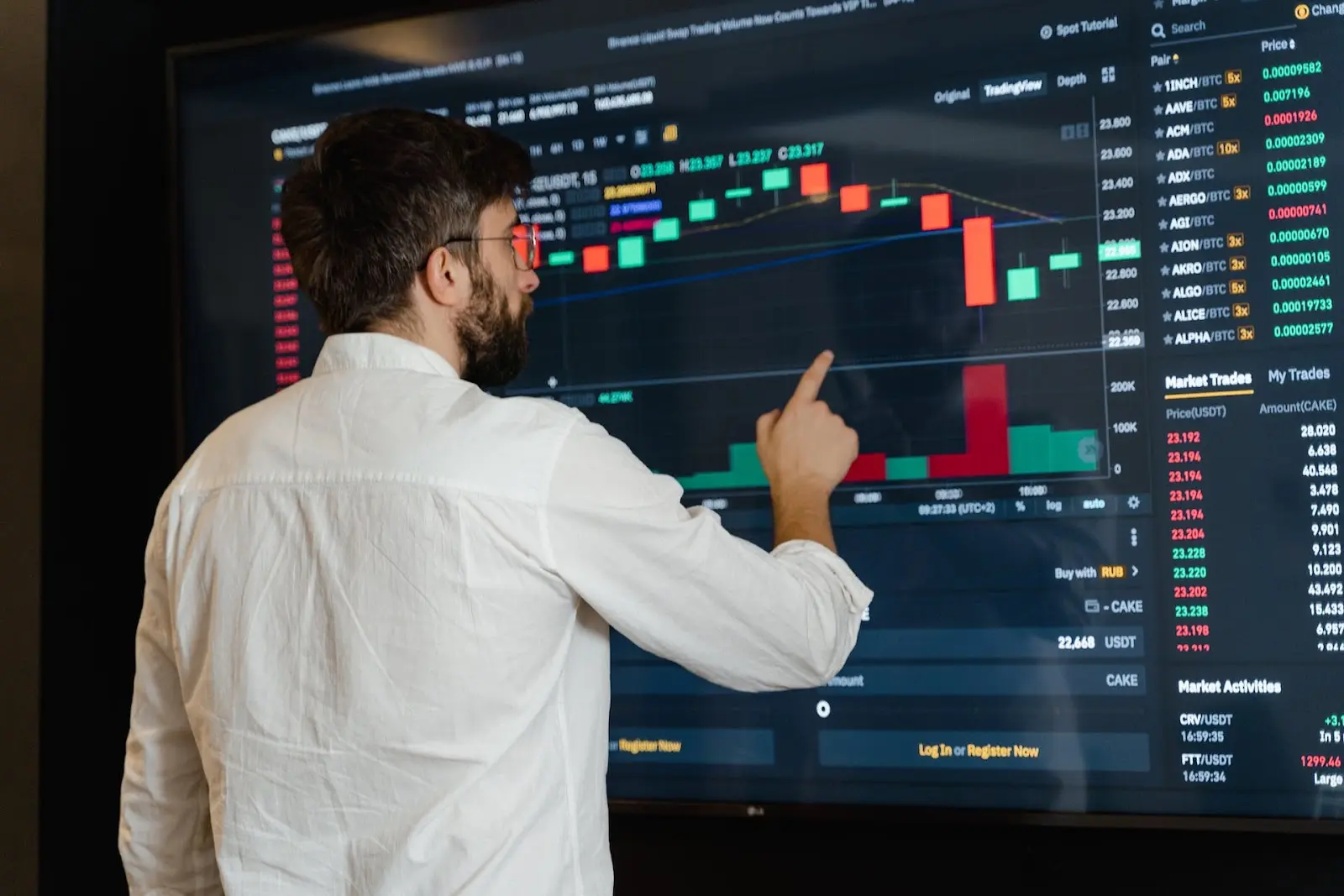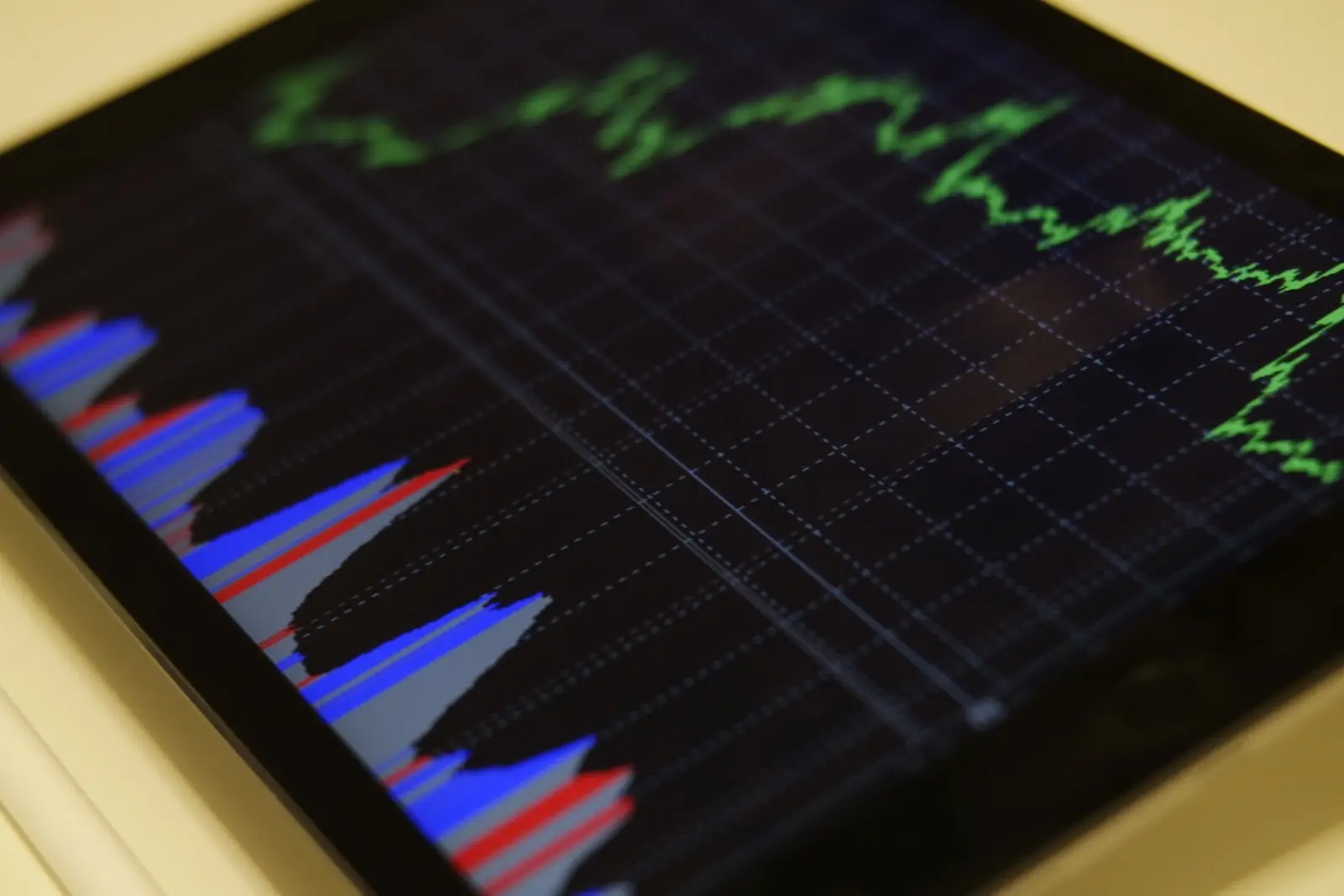Crypto vs. Forex Trading: Key Differences, Pros & Risks

crypto basics
Financial markets have always captured the attention of eager investors willing to take their chances. But before novice and seasoned traders even get to place their bets against one another, they are presented with a dilemma that is crypto vs. forex.
Forex represents an established behemoth in the world of traditional finance. Daily trades are counted in trillions as companies and retail investors all take part in the global economy.
On the other end, there’s the crypto market, which is new, volatile, and filled with promises of riches. It offers financial inclusion, security, and decentralization, but it’s significantly smaller than forex.
In this article, we’ll explore the exact differences between crypto and forex, which is more profitable, and the pros and cons of both. Finally, we’ll help you decide which one is best for you. Let’s dive in!
What Is Cryptocurrency Trading & How Does It Work?

Cryptocurrency trading represents buying, selling, and exchanging crypto assets, such as coins and tokens. The process is similar to traditional stock trading and occurs on cryptocurrency markets facilitated by exchanges.
The market is generally driven by two types of participants:
- Short-term speculators who want to profit from the volatile nature of cryptocurrencies
- Long-term investors who are looking to obtain crypto assets as a store of value
The vast majority of cryptocurrency trading happens on dedicated trading platforms. There are two types of these, and they are:
- Centralized exchange (CEX). CEXs are owned and governed by third parties who act as intermediaries in the trading process. They possess all private keys that individuals use for trading until they request transfers to private wallets. Notable centralized exchanges include Binance, KuCoin, Kraken, and Crypto.com.
- Decentralized exchange (DEX). As their name suggests, DEXs are decentralized platforms with no central governing authority. Crypto enthusiasts can use them to trade assets by connecting their wallets, thus keeping ownership of their private keys at all times. Some popular DEXs are Sushiswap and Uniswap.
Cryptocurrencies are traded in pairs, where the first crypto is considered the base currency and the second is the quote currency. For instance, in a BTC/USDT pair, Bitcoin is the base currency, while Tether is the quote currency.
There are many ways to trade cryptocurrencies, including spot trading, margin trading, and futures trading. When users want to purchase assets immediately, they place a market order, but they can also use limit orders to buy or sell at a desired price.
Another aspect of cryptocurrency trading is liquidity. Bitcoin and major altcoins generally offer much more liquidity than obscure altcoins. Lastly, since the market is fairly new, the regulation is ongoing and constantly changes.
What Is Forex Trading & How Does It Work?
Forex (foreign exchange market) trading is the largest financial market in the world and involves buying and selling currencies. Its daily trading volume goes up to $7.5 trillion, surpassing even the stock market.
Forex trading is, in many ways, similar to cryptocurrency trading. For starters, forex trading also revolves around currency pairs. In the example of a USD/EUR currency pair, USD would be the base currency and EUR would be the quote currency. That’s why many confuse the two markets and wonder, “Is crypto forex?”
Another similarity in the crypto vs. forex comparison is trading platforms. Platforms for forex trading are provided by brokers. They give traders all the necessary tools to facilitate trading, such as charts, analytics, and real-time price updates. Unlike in the realm of crypto, there are no decentralized forex trading platforms.
At its core, forex trading revolves around bid and ask prices. The bid price is the price at which a trader is willing to sell, while the ask price is the buying price. The difference between these two prices is called the spread. Spread is a strong indicator of liquidity; the lower it is, the higher the liquidity.
While the forex market is more mature and less volatile than the crypto market, it features leverage options that can vastly increase both wins and losses. For instance, when a trader opts for 100:1 leverage, they can enter a $100,000 position with just $1,000.
Finally, both forex and crypto traders use two methods of analysis to try and predict market movement. These two methods are:
- Technical analysis, which focuses on charts and indicators based on price movement
- Fundamental analysis, which is based on global news, events, and broad economic indicators
Crypto vs. Forex Trading: Key Differences

To better understand crypto vs. forex trading and find out which one is better for you, you should understand the differences between them. So, let’s examine the most important ones.
#1. Market Size
One of the key differences in the crypto vs. forex clash is market cap. Some estimates put the forex market at more than $2.4 quadrillion. Its daily trading volume hit a record of $7.5 trillion, while the entire crypto market's capitalization sits at around $1 trillion as of 2023.
It’s important to note that the crypto market hit a $3 trillion all-time-high market capitalization during the 2021 bull market run. It has also witnessed huge and rapid growth ever since the introduction of Bitcoin in 2009.
While these are vast discrepancies, they hardly make a difference to a retail investor or trader. Moreover, there is some overlap between the two markets, as fiat-pegged currencies are used in many trading pairs.
#2. Market Participants
Both the crypto and forex markets cater to a wide range of individuals and entities. The forex market features a broader spectrum of traders that range from retail investors to central banks and even governments.
On the other hand, the cryptocurrency market’s lack of regulation and increased volatility still deter some of the biggest corporations and entities. A lot of retail investors are tech and cryptography enthusiasts. Some of the biggest crypto traders and investors are also tech-oriented groups and companies (e.g., Tesla, owned by Elon Musk).
#3. Volatility
Volatility is one of the biggest distinctions between the crypto and forex markets. Crypto markets are notoriously volatile, attracting risk-tolerant investors. Coins and tokens often experience big swings, rewarding successful traders and punishing inexperienced participants with poor risk management.
The forex market is considered less volatile than the crypto market. While relevant global events and news can result in periods of intense volatility, forex offers a safer and more stable environment for risk-averse traders. After all, the forex market’s stability stems from the stabilizing mechanisms employed by nations to protect their currencies.
#4. Structure
Crypto and forex markets are both global and decentralized, with no single governing authority that holds more power over them than the rest. That makes both markets generally safe and reliable for retail investors. The price is mostly driven by the basic economic principles of supply and demand.
Still, due to the size of the crypto market, it is somewhat susceptible to market manipulation and speculation by large investors—whales. Even then, experienced traders are able to spot some of these attempts at manipulation in advance and implement learned information in their trading tactics to get an edge over the rest of the market.
#5. Liquidity
Being the biggest financial market in the world, the forex market is extremely liquid. For the majority of trading pairs (especially the biggest ones, such as USD/EUR or USD/GBP), traders will be able to fulfill their orders no matter the size.
On the other hand, the liquidity in the crypto market varies a lot between trading pairs. Some of the biggest ones, such as BTC/USDT or BTC/ETH are sufficiently liquid. However, issues may arise when traders want to trade some of the smaller altcoins. They might run into large spreads, insufficient liquidity, and other problems.
Cryptocurrency Trading Advantages
Here are some of the key benefits of cryptocurrency trading:
- 24/7 trading. Cryptocurrency markets are available to traders round-the-clock. Many traditional markets have working hours, which significantly lowers availability and impacts trading flexibility. Even forex markets, while open 24/7 on workdays, close on weekends.
- High volatility. While some traders avoid highly volatile assets due to increased risk, others seek them out as they offer opportunities for rapid gains. The cryptocurrency market is famous for huge swings in prices. Even Bitcoin, the biggest and most stable cryptocurrency, can experience significant price shifts in short periods of time.
- Decentralization. Decentralization is a unique characteristic of the crypto market and one of its core principles. The benefits of decentralized exchanges include reduced chances of market manipulation by a governing authority and a lower risk of systematic failure. Plus, they allow for peer-to-peer trading with no intermediaries.
- Asset diversity. The cryptosphere features tens of thousands of coins and tokens. They all differ in value, properties, and use cases. As a result, there are countless trading pairs people can take advantage of. While Bitcoin and Ethereum are some of the most popular, there are many other currencies that can be used for portfolio diversification.
Forex Trading Advantages
Now let’s examine some of the biggest advantages of forex trading:
- Trading volume and liquidity. The biggest benefit that the forex market offers to traders compared to the crypto market is liquidity. With daily trading volume exceeding trillions of dollars, it’s safe to say that market participants will always be able to fulfill their orders, regardless of their size.
- Predictability. The forex market’s size and maturity result in a higher degree of predictability compared to crypto. While every financial market features some levels of unpredictability, the factors that influence it (e.g., geopolitical events and macroeconomic indicators) are easier to analyze and factor in during forex trading.
- Moderate diversity. Compared to the booming crypto market with tens of thousands of coins and tokens, forex features fewer currencies and pairs. Still, there are many pairs to choose from, catering to investors from across the globe. Moreover, the diversity doesn’t get overwhelming, especially for new investors.
- Established regulation. Forex brokers are heavily regulated by influential authorities to ensure their protection and the protection of inventors. They combat any attempt at malpractice while keeping everything transparent. On top of that, in most cases, investors’ funds are insured in cases of malicious activities or bankruptcies.
Cryptocurrency Trading Risks & Challenges
In an attempt to find out which is better, crypto vs. forex, you should not only focus on the benefits but also consider the drawbacks. Here are the biggest flaws of cryptocurrency trading:
- Severe volatility. Cryptocurrencies are susceptible to immense and rapid price movements. While this volatility attracts aggressive investors with high risk tolerance, it deters professionals who want a more predictable and safer market. Moreover, high volatility can be particularly dangerous for inexperienced traders unaware of its effects.
- Regulatory uncertainty. A lack of regulation is another serious problem in the crypto space, especially considering the fact that many investors give their private keys to third parties. Throughout the market’s brief history, there have been numerous cases of fraud, even from seemingly reputable companies and exchanges, such as Celsius and FTX.
- Security concerns. In addition to regulatory issues, crypto traders also need to be aware of potential security problems. Due to its complex and technical nature, the cryptocurrency market is flooded with hackers and scammers. It’s not uncommon for centralized exchanges to be targets of attacks and even lose assets in the process.
- Market manipulation. The size of the crypto market makes it vulnerable to manipulation by whale investors. Their trades and positions can impact the whole market and drive the price of the currency in a chosen direction. Some of the most common tactics include pump-and-dump schemes, stop hunting, insider trading, and more.
Forex Trading Risks & Challenges
To paint a complete crypto vs. forex picture, let’s examine the risks associated with forex trading as well:
- Broker trustworthiness. While the forex market is much more regulated than the crypto market, there are still dishonest actors and unreliable brokers. Investors (especially new ones) should conduct thorough research and carefully select the platform that they are going to use.
- News and global events. The size of the forex market makes it resistant to whale manipulation. However, geopolitical and macroeconomic events can impact the market and cause unexpected volatility. As a result, traders should always be on the lookout for the latest news to try and prevent being caught off-guard.
- Leverage risks. The low volatility of the forex market can be offset with leverage. High leverage allows for control of big positions with small capital. However, inexperienced traders looking for big gains can experience significant and unexpected losses in short periods of time or even get liquidated.
- Fiat trading risks. Certain risks are associated with fiat currencies and the way they operate. Interest rate risks stem from the fact that countries’ interest rates affect their currencies’ exchange rates. The stability of some currencies is also a concern, especially if they are fixed to other currencies, such as the US dollar.
4 Factors to Consider When Choosing Between Crypto and Forex Trading

Now that we’ve listed the most prominent pros and cons of both markets, let’s check out the key factors to consider before choosing your side in the crypto vs. forex clash:
- Risk tolerance. The first thing you should consider before opting for a specific market is your risk tolerance. If you’re a risk-averse person who wants to minimize their losses at the cost of slow progress, you should check out forex. However, if you have high risk tolerance and are attracted by the potential for big gains, the crypto market might be for you.
- Prior knowledge. If you’re a new trader, having some knowledge of either crypto or forex markets can help you progress in them faster. Evaluate whether you’re more familiar with the technology behind cryptocurrencies and blockchain or if you have a better understanding of fiat currencies, interest rates, central banks, and so on.
- Regulation. Do you want a heavily regulated market within well-established jurisdictions? In that case, you should look into forex trading. On the other hand, the cryptocurrency market has ways to go in terms of regulation. Still, a lot has been done on that topic, starting with CEXs implementing KYC as a prerequisite for trading.
- Education and tools. The forex market’s maturity means there are usually more tools, charts, and platforms for individuals to use. There’s also more content for new traders to educate themselves. However, it can also be more challenging to find quality education for forex trading since many courses may have low-quality cash-grabbing copies.
Key Takeaways
This concludes today’s exploration of the differences between crypto and forex. As you can see, there are pros and cons to both markets, and there’s no one true winner. While forex represents a combination of traditional finance and stability, cryptocurrencies combine modern technology with greater risk but also huge upside potential.
For a new trader, the choice in the crypto vs. forex (and even stock) markets often isn’t a straightforward one. That’s why it’s important to spend some time researching them both. After all, that’s way better than spending months practicing and trading before realizing the other market will suit you better.
As always, be careful, stay safe and informed, and pay attention to your leverage. Happy trading!
Crypto vs. Forex FAQ
Is crypto better than forex?
Crypto is better than forex in some aspects and inferior in others. It’s a newer market with a lot of upside potential, but there is also a much greater risk of rapid losses due to the volatility of the asset. Also, there’s a way to go regulation-wise.
Is crypto more profitable than forex?
Crypto isn’t innately more profitable than forex, as profitability mostly depends on the skill of the trader. However, the cryptocurrency market is rather volatile. Without using leverage, traders can experience bigger and faster gains as well as losses compared to forex trading.
What is better for beginners, crypto or forex trading?
Forex trading can be more accessible to beginners who have no prior knowledge of either market. However, if an entry-level trader possesses technical knowledge in the field of crypto, they are likely to perform better when trading cryptocurrencies.
Is crypto trading better than stock trading?
Crypto trading is better than stock trading for those who want faster results. In general, stock prices move much slower than the prices of cryptocurrencies, which is good for long-term, risk-averse investors. Those willing to take on more risk for greater rewards should trade crypto.